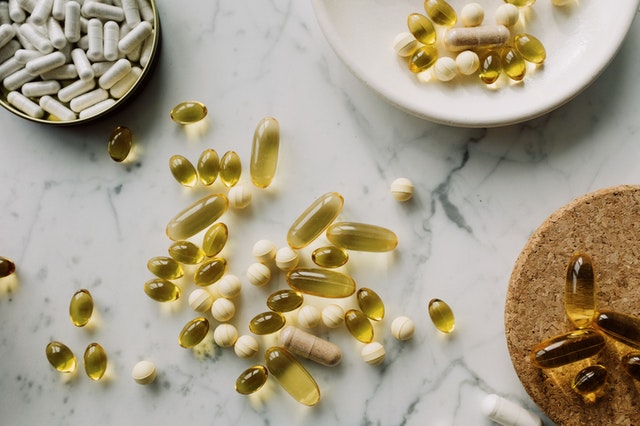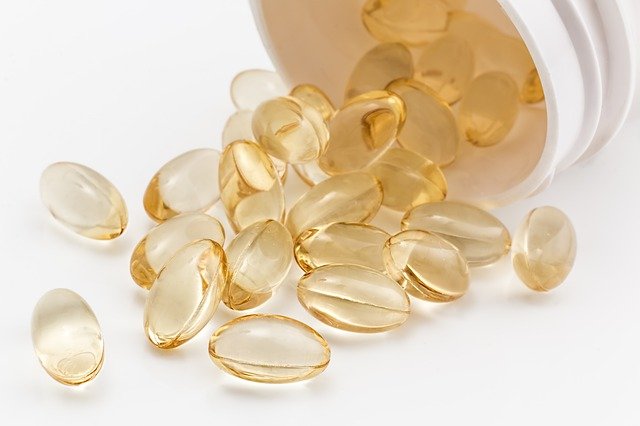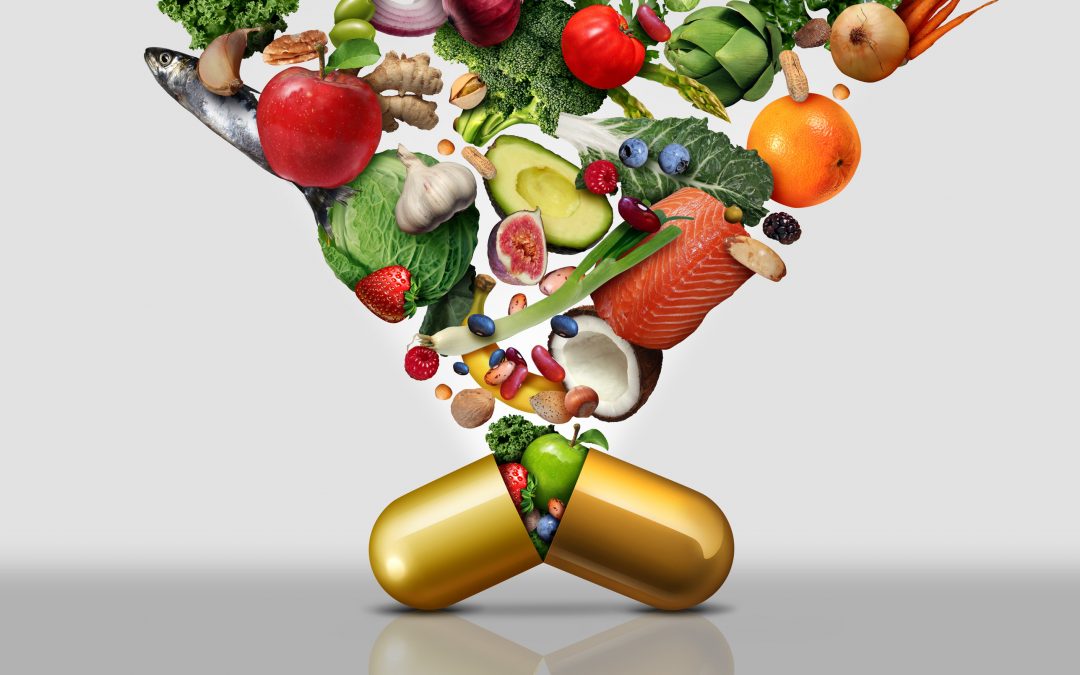NOT ALL SUPPLEMENTS ARE CREATED EQUAL.
- There are NO strict regulations
- The ingredients matter
- The brand you buy matters
- Where you buy it from matters
I will cover problems with consuming synthetic vitamins, how to buy quality supplements, what regulations there are for supplements, why it matters where you buy them, how safe they are, and how they can be beneficial.
What are Supplements? Dietary supplements include ingredients such as vitamins, minerals, herbs, amino acids, and enzymes (FDA, 2017).
- Vitamins protect cells from damage, strengthen bones, help with skin, teeth, eyes, blood clotting, reproduction, etc.
- Minerals the body can’t produce and help with blood pressure, bone health, making new cells, sending oxygen to cells, muscle functions, and more.
- Herbs are therapeutic and they consist of plants or portions of plants.
- Amino acids the body produces 20, but there is another 8 the body needs to receive from their diet.
- Enzymes help with digestion and cellular metabolism.
Choosing Quality Vitamins
There are NO Strict Regulations on Supplements
 FDA is not authorized to review dietary supplement products for safety and effectiveness before they are marketed (FDA, 2017). The regulations on supplements are not very strict. They are required to have new ingredients approved, but for safety only, not effectiveness. Serious side effects are supposed to be reported to the FDA. But, many people report them to the manufacturers who may or may not report it to the FDA.
FDA is not authorized to review dietary supplement products for safety and effectiveness before they are marketed (FDA, 2017). The regulations on supplements are not very strict. They are required to have new ingredients approved, but for safety only, not effectiveness. Serious side effects are supposed to be reported to the FDA. But, many people report them to the manufacturers who may or may not report it to the FDA.
It is the manufacturers responsibility to produce quality products that do not contain contaminants or impurities, and are labeled properly with no misleading or false information. This is known as current Good Manufacturing Practice.
Supplement Ingredients Matter – Synthetic vs Whole Food
What are Synthetic Vitamins? Synthetic (AKA isolated) means it was made by an industrial process.
Problems with Synthetic Vitamins
Due to the lack of regulations and the concept of synthetic ingredients being chemically designed there are a lot of things to be concerned about. Each supplement is supposed to contain an active ingredient. Due to cost savings, many manufacturers will add fillers and synthetic ingredients with very few to non-existent active ingredients. Some products have even been found to have unauthorized prescription medications in them. Not to mention, many nutrients also come in different forms. Often the most absorbable forms are not the ones in the bottle. Additionally, sometimes synthetic vitamins need trace minerals to work, and the synthetic vitamins don’t have them. Therefore, they use the body’s creating a mineral deficiency.
It is also important to know, supplements don’t all break down in the body the way they are supposed to. Powder or vegetable capsules will break down easier than tablets.
Problems with Inactive Ingredients
 Inactive ingredients such as binders, fillers, disintegrants, flow agents, colouring, and preservatives can actually be harmful. There are natural options available, but they are not often used due to the added price.
Inactive ingredients such as binders, fillers, disintegrants, flow agents, colouring, and preservatives can actually be harmful. There are natural options available, but they are not often used due to the added price.
There are many concerning ingredients that can appear in supplements which include
- Carrageenan (cause inflammation in digestive tract)
- MSG
- Hydrogenated Soybean
- Artificial Food Coloring
- Sodium Lauryl Sulfate
- Mineral Oil
- Potassium Sorbate (some have allergies to it)
- Heavy Metals
- Maltodextrin & Ascorbic Acid (made from GMO corn)
- Ascorbic Acid
- Titanium Dioxide (can cause small intestine, lung inflammation, or maybe cancer)
- Magnesium Stearate or Steric Acid (known as toxic flowing agents)
- Magnesium Silicate
- BHT
- Carnauba wax
- Mono and Diglycerides
The Solution: Whole Food Vitamins
If you want something that isn’t chemically made in a lab you need to search for whole food supplements. A whole food supplement will either have the whole foods listed, will say whole-food, or 100% animal or plant-based. Don’t be afraid to ask. Whole food supplements contain the real whole food (whole plant, animal extract). Where as a synthetic vitamin may contain a piece of it, just a nutrient from it, or a chemically processed ingredient. Since whole foods supplements are whole foods they typically have the trace minerals needed for nutrients to be properly absorbed. However, just choosing whole food supplements may not be enough. You should still make sure you are purchasing a reputable brand.
Supplement Brand Matters
 Don’t be fooled by brand names that sound natural or have very natural imagery. There are no standards for labeling something as natural, anyone can do it. Watch out for false claims. Brands can’t say they will treat, diagnose, prevent, or cure any disease.
Don’t be fooled by brand names that sound natural or have very natural imagery. There are no standards for labeling something as natural, anyone can do it. Watch out for false claims. Brands can’t say they will treat, diagnose, prevent, or cure any disease.
Products should contain the name of the manufacturer and distributor. Brands should have their own website and there should be some type of support to be able to ask questions. In order to get the best information on the safety of supplements, it is best to view the NIH, FDA, or USDA websites.
One company that takes great pride in providing whole food nutritional supplements is Standard Process. I’ve seen their products in multiple health clinics and have used their products myself.
Where You Buy Supplements from Matters
Where NOT to Buy Supplements
Grocery stores and big box stores will often stock the cheapest supplements with a focus on costs instead of a person’s health. One study of the supplements sold at GNC, Target, Walgreens, and Walmart found that four out of every five products didn’t contain the ingredient they claimed (CHODOSH, 2021). Many large grocery store companies are also not strict about the shipping and handling. Supplements can be exposed to temperatures that can affect their quality. But buying supplements at online retailers including Amazon, Walmart and eBay can be risky business as all have faced surges in counterfeit shops repackaging knock-off supplements (WeAreFeel, 2019). So it is best to avoid buying your supplements online, just like grocery stores many companies will not be concerned about exposure to temperatures and expiration dates. Additionally, always avoid products outside of the U.S. because you don’t know how they regulate them.
 Where to Buy Supplements
Where to Buy Supplements
- Typically, natural health practitioners will have higher standards for the supplements they stock in their clinics.
- Natural health food stores are a great choice. Just make sure they are knowledgeable about what they carry.
- Search online using FDA, NIH (National Institutes of Health), USDA (United States Department of Agriculture), and ODS (Office of Dietary Supplements) websites to research products.
The supplement store I go to is attached to a clinic so they are very knowledgeable about their products and picky about what they carry.
Here are some questions you can ask to make sure the place you visit is stocking the highest quality supplements:
- Ask if supplements are non-synthetic, whole food
- Check If supplements are GMO-free
- Ask if products have independent lab analysis to check products are pure and high quality
Risks?
 There are obviously risks with supplements. That’s why it is important to purchase from a reputable source and do your brand research. There are risks associated with combining certain supplements, using some supplements with medications or in replace of medications, and over-consuming supplements. Some are unsafe to take while pregnant, some are unsafe for kids, and some are unsafe based on a health condition or recent surgery. However, side effects from supplements are still less common than side effects from medications. But they do have biological effects so it is important to buy high quality and check with a doctor.
There are obviously risks with supplements. That’s why it is important to purchase from a reputable source and do your brand research. There are risks associated with combining certain supplements, using some supplements with medications or in replace of medications, and over-consuming supplements. Some are unsafe to take while pregnant, some are unsafe for kids, and some are unsafe based on a health condition or recent surgery. However, side effects from supplements are still less common than side effects from medications. But they do have biological effects so it is important to buy high quality and check with a doctor.
Be very careful about overdosing. I have heard stories of people saying, “I was deficient in this supplement, so my doctor put me on a high dosage of it and then it began to poison my body.” If you are deficient in something and are put on a higher than normal dosage, it should only be for a short period of time. Then, you should get your deficiency rechecked. You also can’t rely on the supplement stores with no real doctors to give you medical advice. Some are better than others, but their job is to sell you on their products.
Essential Vitamins and Minerals
There are actually 13 vitamins and 16 minerals our bodies require that we should be consuming every day for ideal health.
Essential Minerals: calcium, copper, chloride, chromium, fluoride, iodine, iron, magnesium, manganese, molybdenum, phosphorus, potassium, selenium, sodium, sulfur, and zinc.
Essential Vitamins: Vitamins A, C, D, E, K, B1 (thiamine), B2 (riboflavin), B3 (niacin), B5 (pantothenic acid), B6, B12 (cyanocobalamin), and Folate (folic acid and B9).
There are some products out there that you can actually buy that combine most of these if not all of them. But, I’m not going to recommend them. You may be getting enough of some of these already in your diet. Over-consuming certain vitamins and minerals could cause problems.
I’ve noticed that every natural doctor has different ideas on how many supplements you should consume regularly, which ones are absolutely necessary, and how many of these vitamins you should be getting from food vs consuming as a supplement. Some natural health doctors believe in taking a ton of supplements. Others are big proponents of getting most of your vitamins and minerals through the food you eat. So, being as I’m not a doctor or nutritionist I won’t be making any recommendations. Talk to your doctor. I will however tell you the supplements that most doctors seem to agree on.
Common Vitamin Deficiencies
Here are a few supplements most doctors seem to agree on the importance of:
 Vitamin D
Vitamin D
Most doctors agree that it is important to check Vitamin D levels and supplement if you are deficient. Many people are. I regularly take Vitamin D. Vitamin D is needed for bone, muscle and teeth health. AND really important, always take Vitamin D with K2. You can get a supplement that has both of them together. K2 will help your body absorb Vitamin D better. It makes sure calcium reaches the bones, and Vitamin D increases your calcium levels.
Omega-3
Many also agree that Omega-3 fatty acids are essential. They provide the starting point for making hormones that regulate blood clotting, contraction and relaxation of artery walls, and inflammation (Harvard T.H. Chan). Most people are deficient and there is a test you can take to check your deficiency. My husband I took a test and found we were both very deficient in Omega 3s and now regularly take supplements for it. Omega 3 is hard to consume enough of in your diet alone. It is only found in a few healthy foods which include certain fish (ex. salmon, tuna, herring), flax seed, chia seeds, and walnuts. Is It Possible To Get Too Many Omega-3 Fatty Acids? Experts Weigh In
Magnesium
More than 50% of Americans are said to be deficient in magnesium. Magnesium helps with muscle, nerve function, and energy production. It protects against nearly every modern disease, and can be therapeutic for difficult to treat inflammatory conditions such as fibromyalgia, irritable bowel syndrome, arthritis, etc (Kresser, 2019). Some foods high in magnesium include nuts (cashews and almonds), chocolate, avocado, and legumes.
Collagen
Collagen is also a popular supplementation because as we age we start to lose it, and our skin becomes thinner, wrinkles, and is more fragile. We also can have more achy muscles, joint pain, and bones become more brittle. By age 30 people produce about 1% less collagen a year. Collagen is the most abundant protein throughout the human body, it offers support and strength to everything from our bones to our fingernails (Renew Alliance).
What else? There is also a lot of conversation around taking probiotics, but you can actually get them from the foods you eat, as well. Many people also take multivitamins and many doctors support this, but its hard to say if that is necessary.

Supplements are often overused. But, they are important because many people are deficient in something that is hard to get from their diet alone.
Supplements are Super Important!
Some people might just need to take an iron supplement, B12, or another vitamin if they have signs of deficiencies. It is important to pay attention to health issues. Sometimes symptoms such as being extra tired or having a fuzzy brain could be just pointing to a vitamin deficiency.
Many people are deficient in a vitamin or mineral they need. Rich, poor, well, or sick–92 percent of the population is suffering from at least one mineral or vitamin deficiency based on the Dietary Reference Intakes (the biostation). The food we eat today is far less nutritious than the food that was eaten a thousand years ago. Sadly, we haven’t evolved to not need those nutrients. This is another reason why we see so many people with health issues today. We have more processed food and less nutritious food.
Supplements are NOT a FIX for Living Unhealthy
Often the supplement industry along with many other companies will make it seem like you can keep eating a poor diet and just fix everything with supplements. If you have a doctor that tells you this, run in the opposite direction. Supplements are not fixes for eating unhealthy. They work to complement an already healthy diet. It is incredibly difficult to get all the vitamins, minerals, and nutrients we need in our daily diet. However, we should still aim to get the majority of them from the food we eat. They shouldn’t be used as a regular fix for eating poorly, drinking too much, not sleeping enough, not exercising enough, not drinking enough water, and other wellness practices.
 Supplements for Health Issues
Supplements for Health Issues
Supplements can be amazing for supporting the body when a person is struggling with a chronic health condition. There are thousands of nutritional research studies that provide evidence that vitamins help prevent and treat serious diseases, including mental illness and heart disease, when the nutrients are supplied in sufficiently high doses (WeAreFeel, 2019). Supplements have been a huge part of my personal journey toward improving my health issues.
View All Wellness Lifestyle Blog Posts:
What It Means To Live A Wellness Lifestyle & Why It Matters
How an Unhealthy Spine Can Cause Numerous Problems
How Relationships Influence Our Health (in multiple ways) & Our Success
Managing 3 Stages of Stress (Conscious, Hidden Stress & Preventing It)
Cardio vs HIIT – Find out the Benefits of Both!
How Exercise Can Be Natural & Fun
Nature Heals the Soul, Calms the Mind & Restores the Body
How to Sleep Better & What to do When You Can’t Sleep
Importance of Each Sleep Stage, Sleep Schedules & More
How to Increase Water Intake & Choosing Clean Drinking Water
Key to Wellness: Listening to Your Mind, Body, Spirit/Soul
Addicted to Your Phone? Ideas for Spending Less Time on Your Phone
Resources:
WeAreFeel/27 Health Experts Reveal The Danger Of Cheap Multivitamins. (2019, September 9). Retrieved from: https://wearefeel.com/blogs/learn/danger-of-cheap-multivitamins
the biostation/92% of U.S. Population Have Vitamin Deficiency. Are You One of Them?. Retrieved from: https://thebiostation.com/bioblog/do-you-have-vitamin-deficiency/#:~:text=Are%20You%20One%20of%20Them%3F,-the%20biostation&text=Nutrient%20deficiencies%20exist%20extensively%20among,on%20the%20Dietary%20Reference%20Intakes
CHODOSH, Sara (2021, April 5). Popular Science/Who’s checking if your vitamins and supplements are safe?. Retrieved from: https://www.popsci.com/dangerous-supplement-exposures/#page-3
Kresser M.S., Chris. (2019, March 17). Chris Kresser/Throw Away Your Multivitamins and Antioxidants!. Retrieved from: https://chriskresser.com/throw-away-your-multivitamins-and-antioxidants/
Harvard T.H. Chan/Omega-3 Fatty Acids: An Essential Contribution Retrieved from: https://www.hsph.harvard.edu/nutritionsource/what-should-you-eat/fats-and-cholesterol/types-of-fat/omega-3-fats/
FDA U.S. FOOD & DRUG ADMINISTRATION/Dietary Supplements: What You Need to Know. (2017, November 29). Retrieved from: https://www.fda.gov/food/resourcesforyou/consumers/ucm109760.htm
Dr. Edward Group. (2017, June 16). Global Healing/The Differences Between Sythetic and Natural Vitamins. Retrieved from: https://explore.globalhealing.com/synthetic-vs-natural-vitamins/
MedlinePlus/Vitamins. Retrieved from: https://medlineplus.gov/ency/article/002399.htm
ENZYMEDICA/Are Whole Food Multivitamins Better for you?. (2018, May 11). Retrieved from: https://enzymedica.com/blogs/ingredient-science/are-whole-food-multivitamins-better-for-you
NIH/Using Dietary Supplements Wisely. Retrieved from: https://www.nccih.nih.gov/health/using-dietary-supplements-wisely
Renew Alliance/About Collagen. Retrieved from: https://www.renewalliance.com/pages/collagen-facts
I have a Wellness Coach Certificate, I’m an entrepreneur, an innovator, writer, and artist. My expertise includes over 7 years of marketing, research, and developing content for holistic health businesses. Plus, my own personal journey of becoming chronically sick: understanding what went wrong, and finding a way to heal and live a healthier life. I have a passion for wellness with a wealth of knowledge surrounding: wellness, flaws in healthcare, root causes for chronic illnesses, and alternative treatments.



